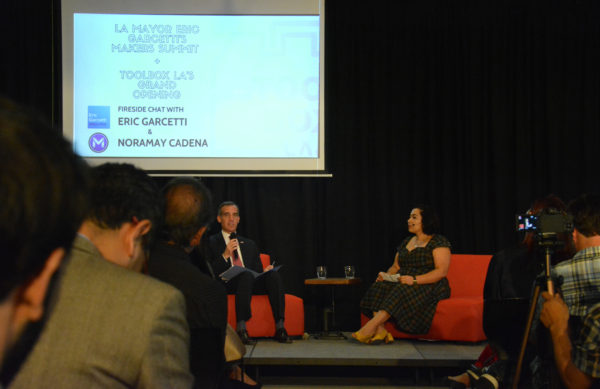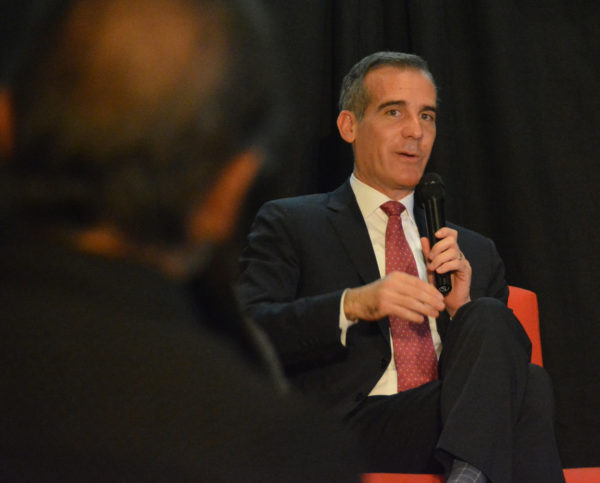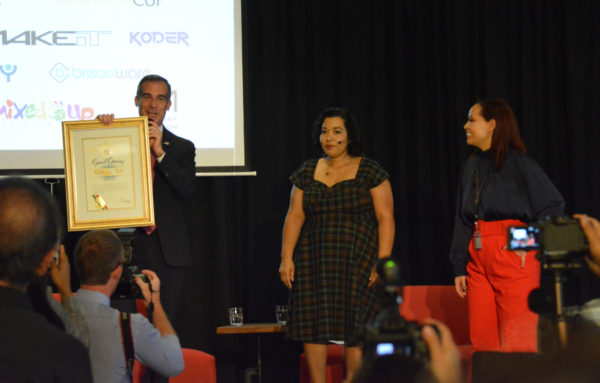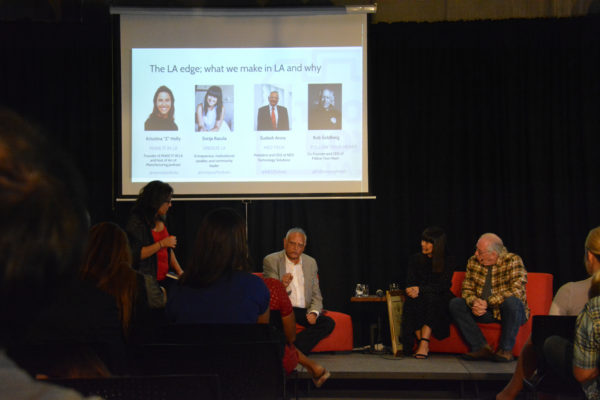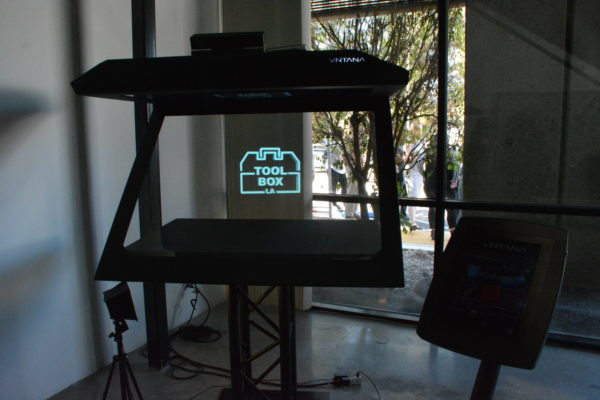by Dot Cannon
“Freedom, innovation…” said Los Angeles Mayor Eric Garcetti. “I don’t like the term…’diversity’,…I like the idea of belonging.
“This is a city where everybody belongs. In a country where everybody should, and does, belong.”
The capacity-crowd audience, gathered at Toolbox L.A.’s official Grand Opening and the Mayor’s Maker Summit on Monday, whooped and applauded.
And the morning was off to an exciting start.
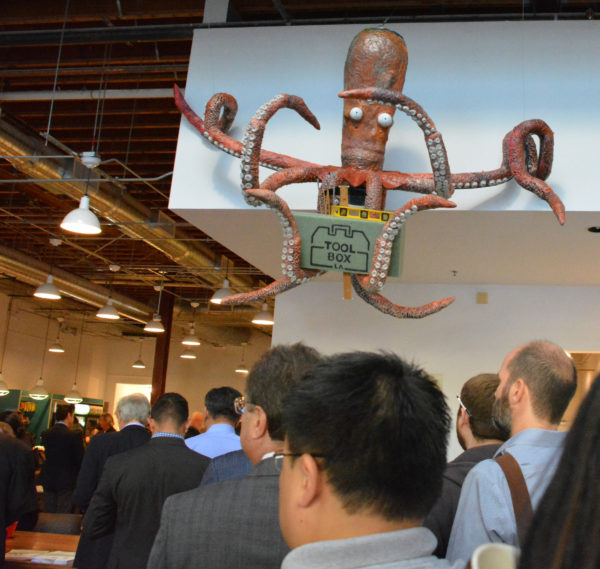
Coworking space and innovation hub Toolbox L.A. was welcoming visitors to its brand-new Chatsworth facility. The day’s program would feature panel discussions, presentations, and networking opportunities for startup entrepreneurs.
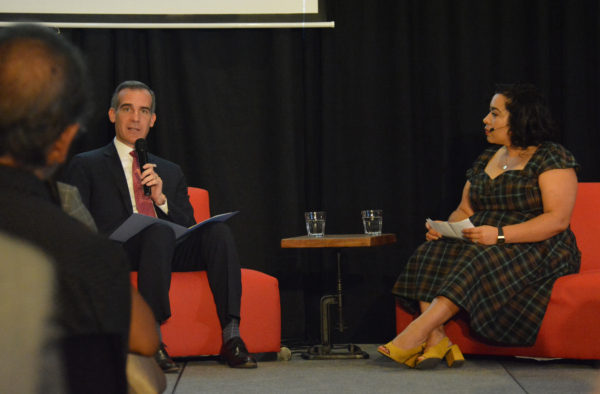
After breakfast and networking, the first program event was in progress: a “Fireside Chat”, featuring the Mayor and Make In L.A. co-founder/managing partner Noramay Cadena.
During the conversation, Mayor Garcetti spoke of L.A.’s pioneering role with startups.
“We’re still the manufacturing capital of America,” he said. The audience whooped and clapped.
The Mayor also referenced Los Angeles’ position as a technology leader.
“I drove by Moog on the way here, where the first synthesizer was invented and built,” he said. “Los Angeles sent the first email in the world…to Northern California…So we have a lot of different (ways we’re continuing to innovate).”
L.A. continues forward
Those ground-breaking steps included some new programs, the Mayor continued.
“We successfully applied for public grants, (receiving) more than two billion dollars (of public and private money) to help us train the next generation of manufacturers,” he said. “We have many active institutions, like CSUN, USC and UCLA that are a part of that.”
Mayor Garcetti said the training would include specific programs to make sure girls and young women would be included in STEM education.
“We just launched a new program for (mentoring, where) we find women around the city (to mentor younger women),” he said.
Other programs, he added, included the HexLab community workshop, “probably about ten different programs through the library and school systems”, and the LA Original program, which supports creative entrepreneur programs in the Los Angeles area.
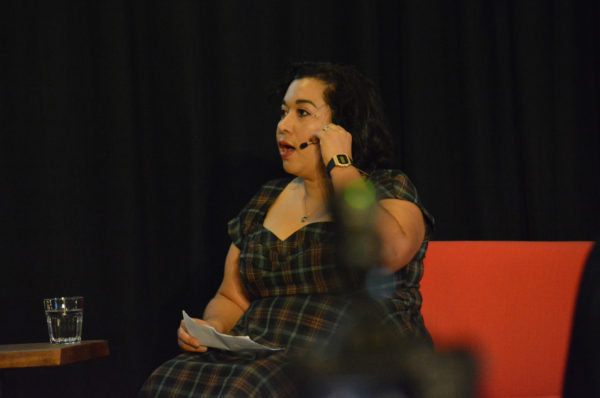
“What gives us the ‘L.A. Edge’?” Noramay asked.
“I think there are three things,” answered Mayor Garcetti. “Freedom, innovation and belonging. I don’t like the term…’diversity’,…I like the idea of belonging.
“This is a city where everybody belongs. In a country where everybody should, and does, belong.”
A community and its members
After the Fireside Chat, the Mayor presented Noramay and her team with a Grand Opening plaque from the City of Los Angeles. He then toured the Toolbox L.A. facility, which offers more than 37,000 square feet of co-working spaces, maker and lab areas and meeting rooms.
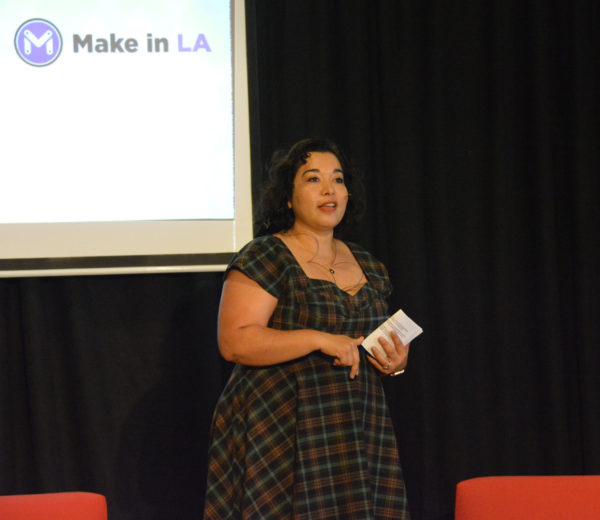
“We opened up our doors (to Toolbox L.A.) in November of last year,” Noramay had explained, at the start of the program. “And we’ve been excited to grow the community, over the last couple of months, and finally give ourselves a big celebration of all the work that we’re doing here.
“Toolbox L.A. gives (startup entrepreneurs) a place to…build, to create, to make things happen. (And) Make In L.A. is..a big supporter of Toolbox L.A. (Three and a half years ago, Make In L.A. began when) we took a look at the startup community in Los Angeles and saw a big void for early-stage hardware startups. We wanted to…invest in them, and we wanted to build community around them to make them successful.”
That community-building, she said, involved investing in 19 companies. Over the past three and a half years, those companies have raised over 65 million dollars in revenue, domestically and internationally.
(Here is a link to our 2016 Over Coffee® interview, in which Noramay shares the story of Make In L.A, which is a Toolbox L.A. partner.)
And Toolbox L.A. continues to support the startup community by providing manufacturing tools, regular educational and networking events, and numerous resources.
Opening with opportunities
As Monday’s program continued, attendees had the opportunities to hear additional presentations, tour the new facility and meet with some of the startup entrepreneurs onsite. Several prize drawings resulted in attendees receiving free gifts.
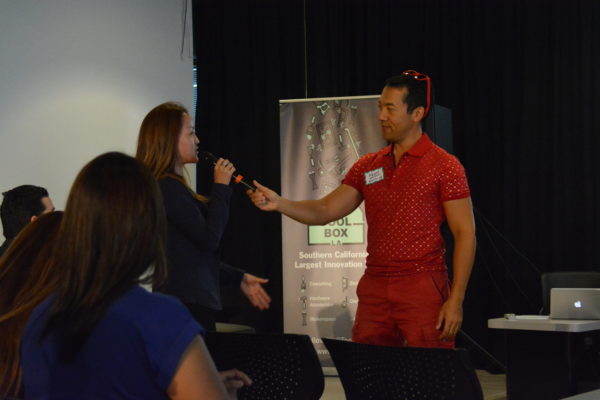
In addition, Digital L.A‘s Kevin Winston circulated with a mic, asking entrepreneurs to share information about their startups. Networking ensued, as attendees found like-minded “creatives” in their fields.
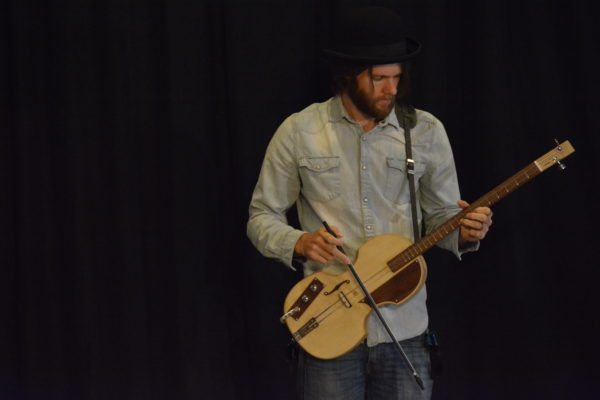
A musician identified as “Jude” played the guitar he had made at Toolbox L.A.
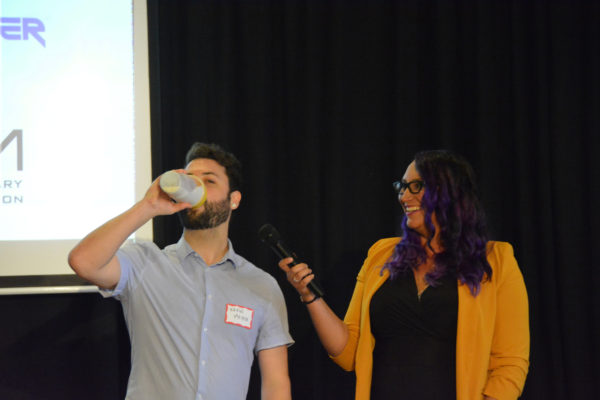
And Toolbox L.A. member and startup co-founder Kevin Meyer showed the audience his company’s innovation, the CrunchCup–the world’s first portable cereal cup.
Perspectives on manufacturing
Another highlight of the day’s programming was the panel entitled, “The L.A. Edge: What We Make In L.A. and Why”.
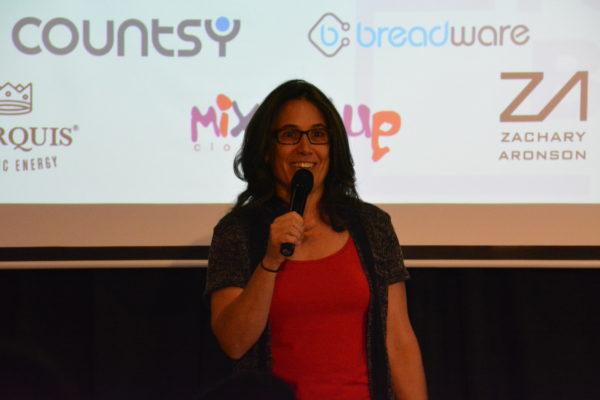
Panel host Kriztina “Z” Holly is the founder of Make It In L.A. and host of The Art of Manufacturing podcast. For the next twenty minutes, she would explore the L.A. manufacturing scene with three experts from very different backgrounds.
Despite their varying industries, though, all of the panelists discussed the importance of high quality and connection with community, for Los Angeles entrepreneurs.
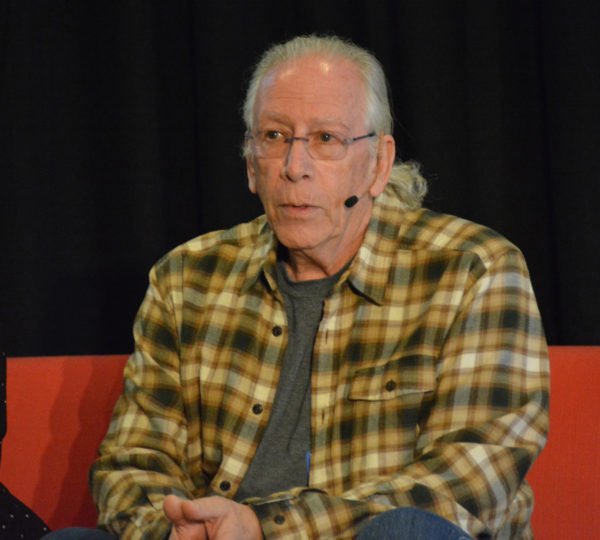
“The philosophy behind products is that the products themselves, and the companies that make them, have to have integrity,” said Follow Your Heart co-founder and CEO Bob Goldberg. Sustainability, he said, was important for his company, which started offering natural food products in 1970.
“Many of the products we make are organic.”
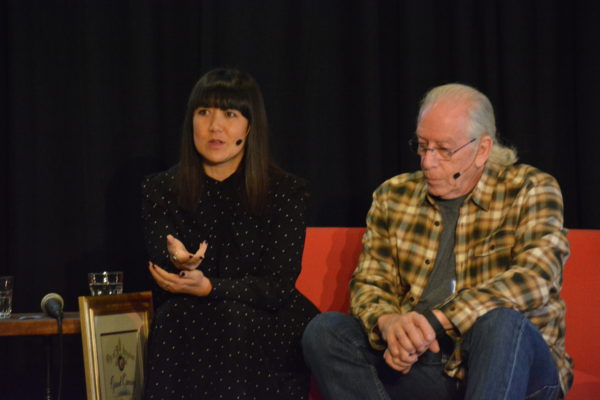
Storytelling is key, said Unique L.A. founder Sonja Rasula, and new entrepreneurs need to think “local”. Her company, Unique Markets, curates local two-day popup shopping events.
“We believe that you can shop locally for everything in your life–not just the vegetables and fruits,” she said.
“The new generation of people starting businesses are starting to understand how their money can affect (the communities).”
“When do you manufacture in Los Angeles, and why?” asked “Z”.
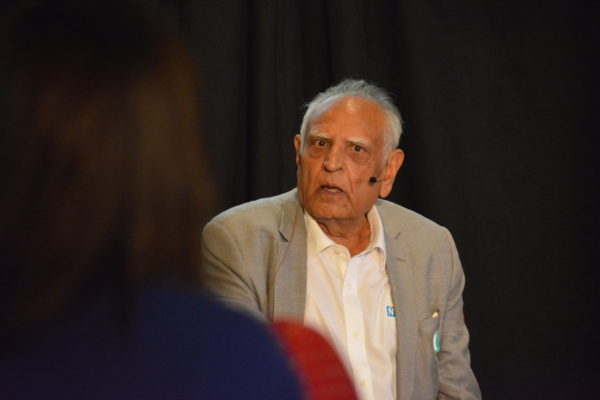
“I came to Los Angeles fifty years ago,” said NEO Tech Solutions Founder and President Sudesh Arora.
“To be honest, we do any work that requires high quality in Los Angeles.”
Headed into the future with robots
High-quality education figured largely in the next presentation.
Make In L.A. Managing Director Shaun Arora hosted a panel entitled, “The Robots Won’t Take ALL the Jobs…Or Will They?”
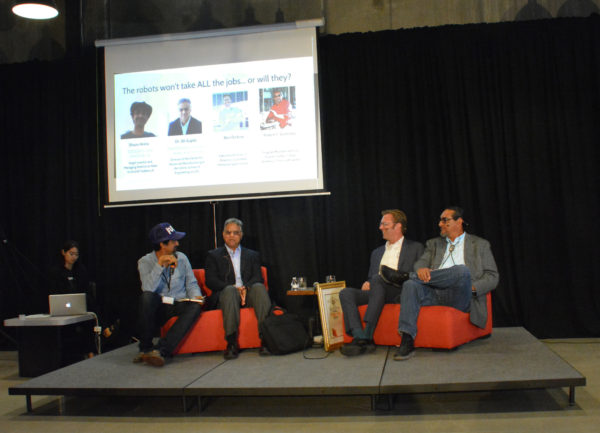
“Tell me a little more about how humans should be working with robots,” Shaun asked, early in the panel.
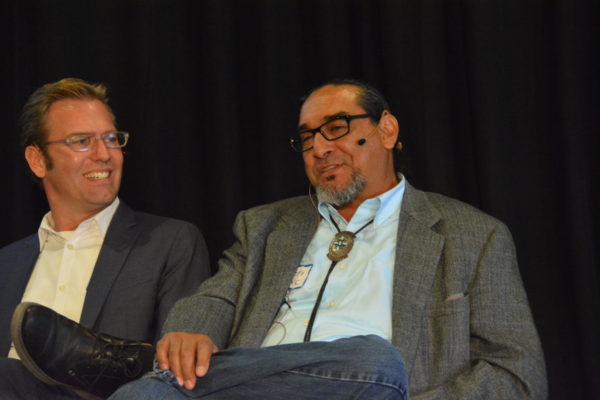
“A robot is as good as its program,” responded Los Angeles Valley College Program Manager Robert F. Gutierrez. “At some point, we’re going to have robots program themselves, but that’s (in the future).”
“Now that (manufacturing is) changing, people are afraid all the jobs are going away,” contributed Columbia Memorial Space Center Executive Director Ben Dickow. “How do we train up the next generation of manufacturers?”
Shaun and his guests spent some time exploring the ways in which automation may actually be creating new jobs, and the education involved.
“I manage a six-week training program that helps people get back to work (following a layoff),” said Robert. “We can’t keep up with the demand (for trained manufacturing workers).”
“We have a third-grader (participating) right now,” Ben said, as he explained the Columbia Memorial Space Center’s educational programs.
“The number one reason people go into a STEM career, is they have a science-education experience by the age of thirteen.”
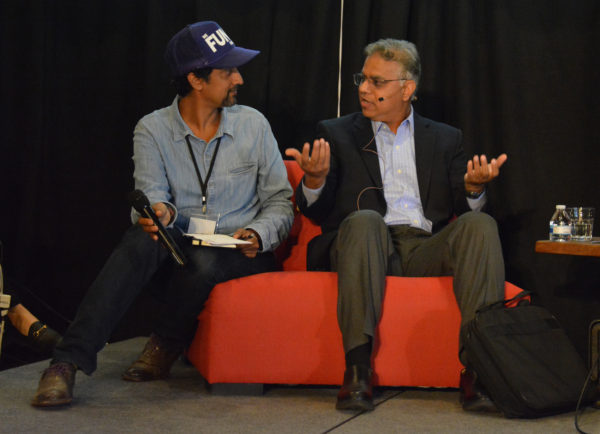
“People (need to understand) that they have to reinvent themselves constantly,” said Dr. S.K. Gupta, Director of the Center for Advanced Manufacturing at USC Viterbi School of Engineering.
“It’s not going to be, ‘go to a four-year college and then you’re done’.”
Essential skills for roboticists
So–what skills might future roboticists need? The panelists agreed that coding was important.
“We’re old-school,” Robert said. “We don’t want people crashing robots. They’re expensive.”
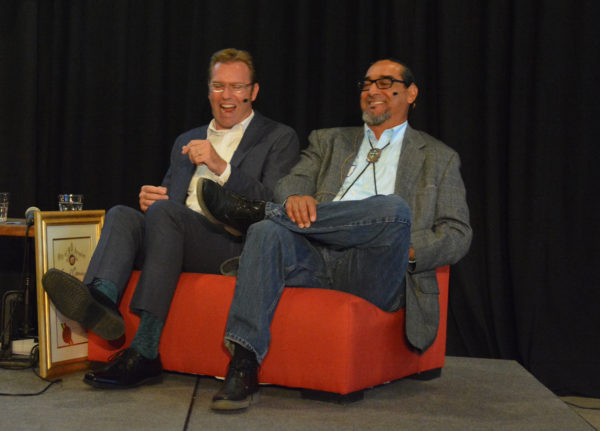
Besides coding, Robert, Ben and S.K. said, several other skills were essential for the job-seekers of the future.
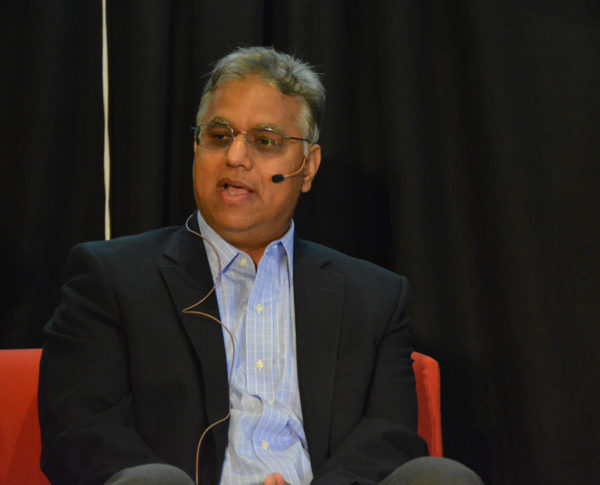
“We are educating students how to be creative, how to solve problems,” S.K. explained.
Robert pointed up an area that may not occur to prospective employees, at first.
“Soft skills, believe it or not,” he said. “If they can’t show up on time and have a (bad) attitude, (they won’t succeed).”
And Ben offered a “pitch” that teachers and parents of future roboticists may want to note.
“At Columbia Memorial Space Center, we have a Science Day every April.”
Meeting the makers
But one of the best parts of the day, without question, was still to come: an opportunity to talk with the makers who are bringing their vision to life through Toolbox L.A. and its supporters.
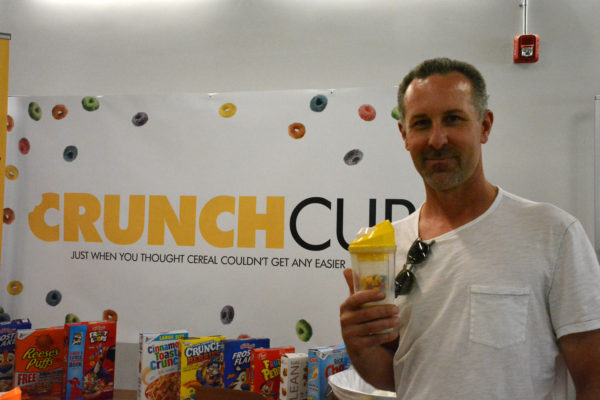
Rob Lambert. creator of The CrunchCup, shared the story of his creation. The CrunchCup will soon launch a 30-day Kickstarter campaign–and they’ll donate a meal to nonprofit No Kid Hungry, for every CrunchCup customer order!
Next to the CrunchCup display was the largest 3D printer we’d ever seen, anywhere.
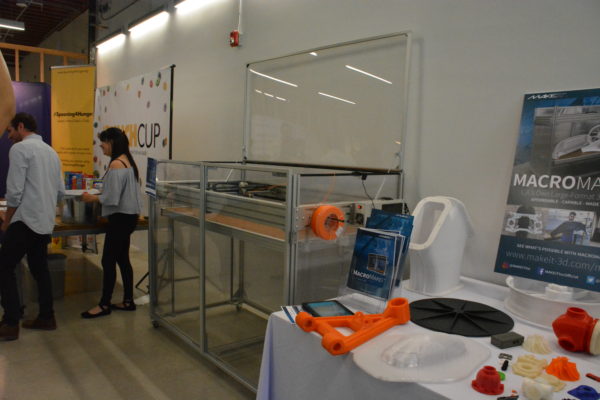
From Makeit, this is the “MacroMakeit”, which is currently live on Kickstarter. It has a two-foot-by-four-foot print area–and Makeit President and Co-founder Shelley Sun says the printer just became available, this week!
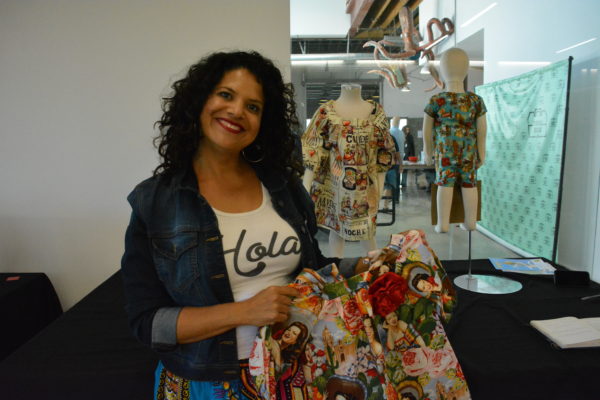
Mixed-Up Clothing owner/creator Sonia Smith-Kang designs this multicultural children’s clothing line. The textiles and styles are ethnically diverse, and each item comes with a little story about the culture it represents, such as Latin American, African, Asian, or Hawaiian.
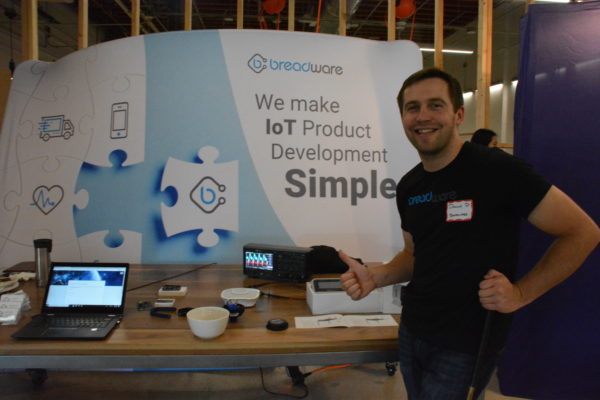
And Danny D., of Breadware, offers services to help develop products for the Internet of Things! Asked how long he’s been with Toolbox L.A., Danny said, “One week,” and that he loved being a part of the community.
Enjoy, Danny. You are in for an amazing ride!
Toolbox L.A. Innovation Hub and Coworking space is located at 9410 Owensmouth Avenue, in Chatsworth. Here’s the link for facility tours.

